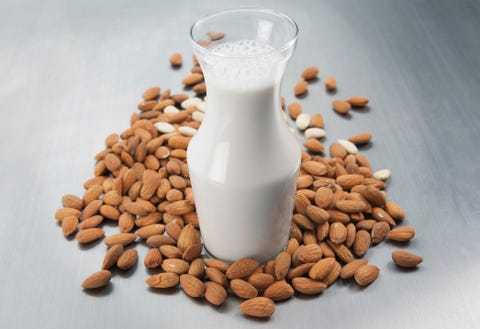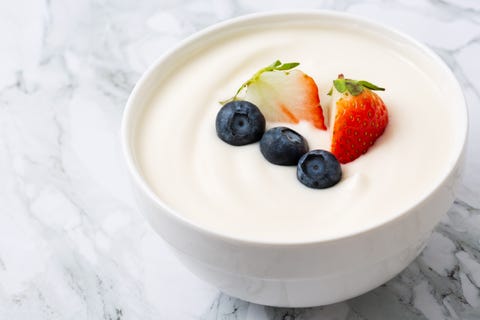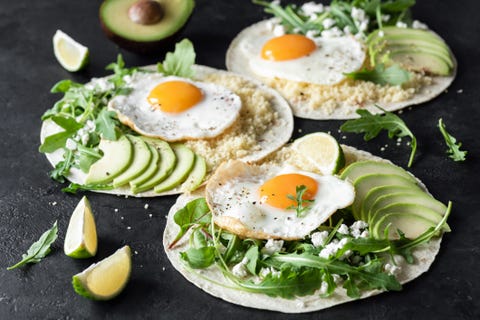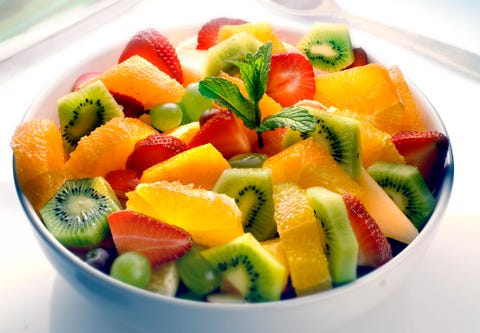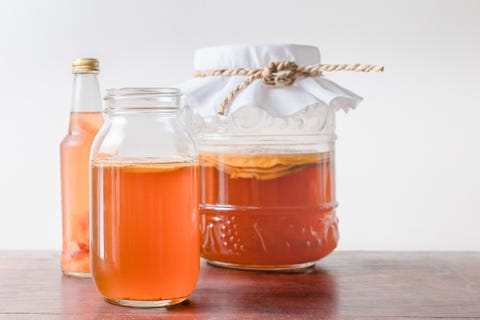I\u2019m A Registered Dietician. Here Are 6 Things I Always Have In My Fridge.
Stocking a fridge full of foods that provide adequate nutrition and that you actually want to eat can feel like a daunting task. Especially if you’re a member of the wilted week-old lettuce club or struggle to find something to snack on behind all those cans of seltzer and plastic tubs of takeout leftovers. So we asked Abbie Gellman, registered dietitian and chef at the Institute of Culinary Education, to share what’s regularly in her fridge and give us a baseline map for how to stock a healthy one.
“My fridge is always packed, there’s a lot of kitchen Tetris happening,” Gellman says from her home in New York City. Here, she peers past the stacks of clear containers and bunches of fresh produce to share her expert insights on how to maintain a well-stocked, nutrition-forward fridge.
Unsweetened Plain Almond Milk
“I often prep meals or ingredients for the week ahead, I like to make overnight oats a couple of times a week using almond milk. It’s a delicious, nutritious option not only for overnight oats but also for steel-cut oats, cereal, baked oatmeal, and many other breakfast ideas,” Gellman says. She emphasizes that almond milk is an especially good choice for people who are vegan or dairy-free, since it is naturally rich in nutrients and fortified with ones that those diets may be lacking, such as vitamin D and calcium.
Plain Greek Yogurt
“Plain Greek yogurt is super versatile and I use it for a wide range of dishes,” Gellman says. “The sky’s the limit here!” For example, she pairs yogurt with fruit and nuts as a simple breakfast or snack. She also uses it in place of mayonnaise for protein-based salads like egg, tuna, or chicken salad. In baked goods, Gellman uses Greek yogurt frequently, because it adds protein, flavor, and acid to all sorts of baked goods such as muffins, pancakes, and quick bread. She’ll also dollop the thick yogurt on top of baked potatoes or mix it into pureed soups. “It’s packed full of nutrients, with an average of 15 grams of protein per serving and is a good source of calcium, vitamin B12, and much more,” Gellman says.
Eggs
“Eggs are another staple in my diet and my fridge. They’re super versatile, delicious, and healthy,” Gellman says. “One egg contains 6 grams of lean protein. In addition, eggs contain 13 essential vitamins and minerals including vitamin D, choline, lutein, and zeaxanthin.” She’ll often hard boil some eggs to keep in the fridge to eat as snacks or use in her salads. Frying an egg to top savory oatmeal, mixed with roast veggies, is another favorite.
Vegetables
“I always have a wide range of veggies in my refrigerator. Year-round, I always have carrots, celery, leafy greens, cauliflower, and broccoli,” Gellman says. “Many of the other vegetables depend on the season, but often my produce drawer is super packed. Vegetables provide an assortment of vitamins, minerals, antioxidants, and dietary fiber.”
Living in the city doesn’t stop Gellman from enjoying her farm-fresh produce. She gets a CSA box delivered through an online grocer and will supplement with trips to the farmer’s market and her local grocer. During the winter, she often has lots of leafy greens, root vegetables, and squash, which she’ll batch cook for a week of easy meal prep.
“I cut up a bunch of acorn squash, sweet potatoes, carrots, parsnips, whatever comes in my box, to about the same size, and roast them with some olive oil, salt, and pepper,” Gellman explains. “I have those for the whole week and use them for breakfast, lunch, and dinner in a thousand different ways.” Other veggies are used in salads, which Gellman has lately been dressing with a combo of tahini mixed with yogurt or almond milk and lemon juice, which can be batched and kept in the fridge for a week.
Fruits
“I always have fruit in my fridge,” Gellman says, In the winter, some fruit storage migrates to the freezer, where she stocks both prepacked frozen fruits and sweet treats like berries, preserved from the summer months. Citrus is another year-round staple for Gellman, including clementines, lemon, and limes. “The acidic quality in these fruits adds a brightness and a nice pop,” she says of cooking with fresh citrus, which contains Vitamin C. In the winter, apples and pears are also a staple in her fruit drawer.
Kombucha
“I order a case at a time,” Gellman says of her kombucha habit. She’s partial to a local, Brooklyn-based brand and drinks a bottle almost every day. “I don’t drink soda, so I like the fizzy quality. I also don’t drink caffeine after the morning because it keeps me up, so I like having a non-caffeinated (or decaffeinated, if there’s tea in it) beverage in the afternoon that’s refreshing,” she adds.“Kombucha is fermented, so a lot of the good probiotics and gut health that goes along with that is a positive. Plus, there isn’t a lot of sugar in it.”
Source: Read Full Article

